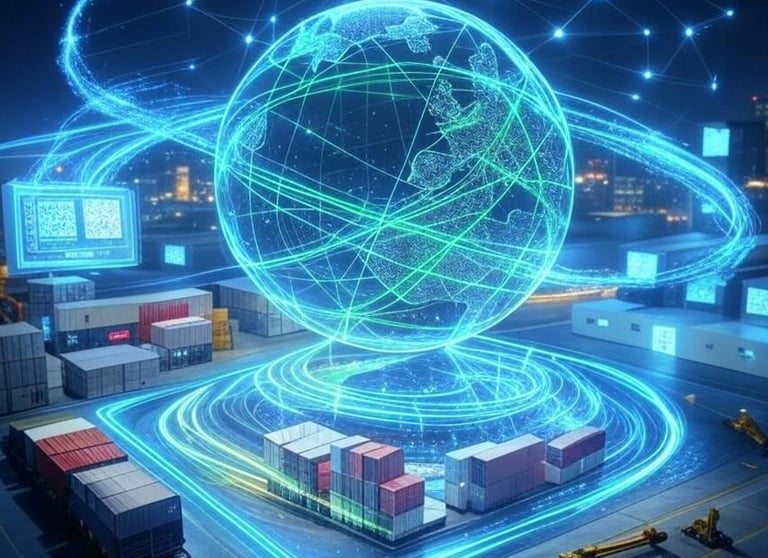Blockchain and Supply Chain: Ensuring Global Transparency and Traceability
godidgo.com
11/30/20244 min read


Understanding Blockchain Technology
Blockchain technology represents a revolutionary shift in how data is stored and managed. At its core, a blockchain is a decentralized digital ledger that securely records transactions across multiple computers. This decentralization ensures that no single entity has control over the entire network, thereby enhancing security and transparency. Each transaction, or block, is linked to the previous one, forming a chronological chain. The fundamental characteristics of blockchain technology—decentralization, immutability, and consensus mechanisms—contribute significantly to its potential applications.
Decentralization is a crucial element of blockchain. In traditional systems, data is controlled by a singular organization, leading to vulnerabilities regarding data integrity and security. With blockchain, however, the ledger is distributed across a network of nodes, meaning that each participant has access to the same information. Changes to data must be agreed upon by consensus, which reinforces the reliability of the information stored on the network.
Immutability is another key feature of blockchain technology. Once a transaction is recorded in a block and added to the chain, it becomes virtually impossible to alter. This characteristic is achieved through cryptographic hashing, which secures the data and links it to the previous block. As a result, any attempt to change a single block would require altering all subsequent blocks, making fraud nearly undetectable.
Lastly, blockchain employs various consensus mechanisms such as proof of work and proof of stake to validate transactions on the network. These mechanisms ensure that all participants agree on the accuracy of data before it is added to the blockchain. This process not only maintains the integrity of the transactions but also prevents unauthorized alterations.
Collectively, these defining traits of blockchain establish a robust framework that is increasingly being leveraged across various fields, particularly in supply chain management where transparency and traceability are paramount.
The Current State of Supply Chain Management
Supply chain management (SCM) has evolved significantly over the years, but it still grapples with numerous challenges that hinder optimal performance. Traditional supply chain processes often lack transparency, leading to a multitude of inefficiencies. For instance, participants in the supply chain may struggle to obtain real-time visibility into inventory levels, shipment statuses, and potential bottlenecks. This lack of transparency not only complicates decision-making but can also lead to increased operational costs and delays in delivery.
Additonally, fraud remains a critical issue within supply chains. The absence of standardized procedures and open communication channels allows unscrupulous activities to flourish. From counterfeit products to unethical sourcing, the repercussions of fraud can be extensive, damaging both company reputation and consumer trust. As businesses increasingly rely on global suppliers and distributors, the traditional systems in place often fall short in ensuring accountability across the entire process.
Inefficiencies are also evident in the cumbersome practices of handling documentation and information sharing. Many companies still depend on paper-based systems or outdated technology, which not only slows down operations but also heightens the likelihood of errors. This fragility becomes even more pronounced during crises, such as natural disasters or geopolitical disruptions, when robust supply chain stability is paramount.
Thus, there is a pressing need for solutions that enhance traceability and improve overall accountability within supply chains. Businesses and stakeholders are motivated to explore innovative approaches that address these shortcomings and foster a more integrated and responsive supply chain ecosystem. As organizations seek to overcome these challenges, the exploration of blockchain technology presents a promising avenue worth considering.
How Blockchain Enhances Transparency and Traceability in Supply Chains
The integration of blockchain technology in supply chains significantly enhances transparency and traceability. By utilizing a decentralized ledger, all participating entities in the supply chain can access a secure, tamper-proof record of transactions. This aspect of blockchain ensures that every movement of goods is logged and can be audited at any time, allowing stakeholders to trace the origin and journey of products throughout the supply chain.
One of the most compelling features of blockchain is its ability to create a single source of truth. When raw materials are sourced, each transaction can be recorded along with key data, such as time stamps, quantity, and quality checks. This comprehensive dataset is not only visible to all parties, including manufacturers, suppliers, and retailers, but also immutable, meaning that data cannot be altered retroactively without consensus from all stakeholders. This characteristic dramatically reduces the likelihood of fraud and helps in mitigating risks associated with counterfeit goods.
Various companies have already adopted blockchain solutions to enhance their supply chain processes. For instance, Walmart has implemented blockchain technology to track the provenance of food products. By scanning a product's QR code, consumers can trace their food back to its farm of origin, ensuring both safety and transparency. Similarly, De Beers, a diamond company, uses blockchain to document the journey of diamonds, ensuring they are conflict-free and ethically sourced. Such real-world applications highlight the effectiveness of blockchain in fostering trust and accountability within supply chains.
As more organizations recognize the benefits of blockchain, the technology may become a standard in ensuring enhanced transparency and traceability. Innovations in this area offer promising solutions for future challenges in supply chain management, ultimately leading to more efficient, reliable, and sustainable practices.
Challenges and Future Outlook for Blockchain in Supply Chains
The integration of blockchain technology into supply chains presents various challenges that stakeholders must navigate. One significant hurdle is technological adoption. Many organizations within the supply chain ecosystem may lack the technical expertise required to implement blockchain solutions effectively. This technological gap can hinder a seamless transition and stall the potential benefits that blockchain promises, such as increased transparency and traceability.
Furthermore, the costs associated with blockchain implementation can be a barrier for many businesses. While the decentralized nature of blockchain can reduce some operational costs in the long term, the initial investment in infrastructure, training, and ongoing maintenance can be substantial. Small to medium-sized enterprises (SMEs) may find it particularly challenging to allocate sufficient resources toward this transformative technology.
Regulatory issues also pose significant challenges. The lack of widespread regulatory frameworks governing blockchain usage can create uncertainty for organizations looking to adopt these systems. Different regions may have varying regulations, which can complicate cross-border supply chain operations. Stakeholders must engage with regulatory bodies to create an environment conducive to the harmonious integration of blockchain technology.
Looking towards the future, there are several promising developments on the horizon for blockchain in supply chains. As awareness of blockchain’s benefits grows, more organizations are likely to explore collaborative models that leverage this technology. Advancements in interoperability between different blockchain platforms may also enhance data sharing and integration across supply chains, streamlining operations and improving efficiency.
Moreover, the rise of decentralized finance (DeFi) and other blockchain innovations could lead to new business models and increased competitiveness in the supply chain sector. While challenges remain, the continued evolution of blockchain technology holds the potential to reshape supply chains fundamentally, promoting transparency, traceability, and trust in global commerce.

Get in touch
Feel free to contact us to inquire about any of the Web2/DNS and Web3/Onchain domains showcased on our platform. We are open to receiving proposals and evaluating direct purchase offers for all the digital assets featured.
Our team is also available to explore tailored agreements and negotiated sales, ensuring a smooth and efficient acquisition process that aligns with your specific needs.
Connect with us to amplify your identity across both the Web2/DNS & Web3/Onchain landscape. Together, let's redefine the future of digital identities and brands.
Contact us now to elevate your DIDs & Brands to new heights, because in the world of Go DID Go! your Digital Identity is not just owned; it's celebrated!
Contact Us
info@godidgo.com




